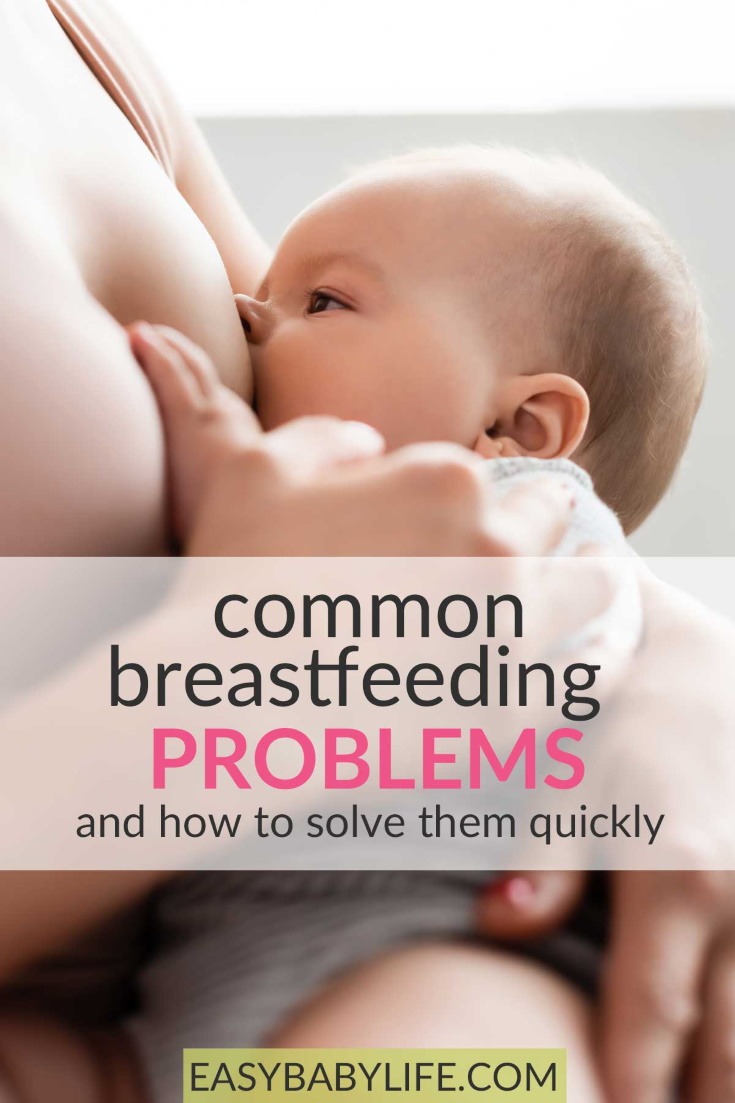Does your baby fall asleep while nursing, bite you, or want to nurse very often? These and other common breastfeeding problems are solved here.

For some women, breastfeeding works great from the beginning, but breastfeeding problems are very common. Ask around among your friends, and you’ll see that you are not alone!
As many as 60% of all moms quit breastfeeding earlier than they really want due to various breastfeeding problems! (Source.)
If you struggle to breastfeed, it only means that you are learning! And your baby too. You are not failing, and you are definitely not a failure.
Here are some of the most common breastfeeding problems that nursing moms have and tips on how to solve the issues.
But don’t play supermom. Get help to get breastfeeding right!
How To Solve The Most Common Breastfeeding Problems
In this article…
My Baby Falls Asleep While Breastfeeding
Some babies, especially those younger than 3 or 4 months old, tend to fall asleep quickly when nursing. This can be a bit of a breastfeeding problem if your baby doesn’t eat enough to become full before falling asleep. This will mean very frequent feedings.
In general, you should strive to have your baby feed with concentration for at least 5 or 10 minutes before going to sleep. If he drifts away before that, try rubbing the palm of his/her hand or foot. Young babies often start suckling again if stimulated in that way.
You can, of course, try disturbing your baby a bit by changing position or burping him. Another tip to try is to massage your baby’s hand a little bit when he or she is falling asleep. For some reason, this seems to trigger the baby to start feeding again, at least for very young babies.
My Baby Swallows Too Much Air

If you suspect that your baby swallows a lot of air – for example, if he/she gets a lot of gas and tummy pain – it is worth trying alternative feeding positions.
One position is to keep your baby more upright, the so-called saddle position. Hold your baby to nearly have him sit on your lap rather than lying horizontally.
Another possibility is to lie down together with your baby. When you lie down, the milk flows more slowly, helping your baby swallow less. Just make sure you position your baby so far down that he or she has to stretch their neck up a bit to reach the breast. This will make the latching and swallowing easier for the baby.
Also, take some extra care to really burp your baby. This is also a way to prevent tummy pain.
My Baby is Not Interested
Some babies just love breastfeeding; others become disinterested from time to time. If your baby seems to get disinterested after a couple of weeks or months, don’t panic. Many babies have nursing strikes.
Continue to offer the breast. Unless 8 months old or older, most babies want to continue breastfeeding. Even older babies may want to continue, but when they have started eating a lot of solid foods, some babies prefer that over the breast. In such a case, you will have to decide if you are ready to wean your baby or if you want to continue to encourage breastfeeding.
Older babies also get distracted quite easily. Try going to a quiet place when nursing, or use a blanket to cover your baby.
My baby got his first teeth – scary!
While your baby’s first tooth is definitely a milestone, if you still breastfeed, you might have mixed feelings about this white, sharp little pearl. Most babies won’t get their first tooth until they are 4 to 8 months old, but some get them earlier.
(For teething symptoms, read here.)
Well, relax. Most babies’ first teeth are the central incisors in the lower jaw. To nurse, your baby covers these teeth with his tongue, so he won’t be able to bite you while suckling.
If you are at risk of being bitten (it has happened before), you might want to keep a close eye on your baby to see a change in the tongue or of the nipple in your mouth. At any sign of biting, quickly but gently put your finger into your baby’s mouth and release your breast.
Later on, there is a higher risk that you will get bitten, but babies learn fast.
If you jerk or make a sound when he bites you, your baby will soon understand that he should avoid chewing on you. Try not to scare your baby, though, even if it hurts! It’s much better to try to prevent the biting by watching your baby.
Some common reasons that a baby bites are teething, that he or she has emptied the breast and is throwing his head away from your breast before actually opening their mouth enough, and accidental biting, for example when trying to look at something interesting.
My baby wants to eat all the time
One of the most common breastfeeding problems (from the exhausted mom’s perspective) is that many new babies want to nurse very often.
“I am breastfeeding all the time…” is a common complaint among new, first-time moms.
Forget the three hours in between meals! Especially in the evening, the only way to keep your baby from crying might be to let them breastfeed – more or less without stopping.
Obviously, this is not all hunger! Comfort and consolation are two other important reasons why infants want to nurse. (Read about the pros and cons of nursing a baby to sleep here.)
This period of very frequent breastfeeding will not go on forever, of course. At some point between 2 and 4 months, many babies become more predictable and eat less frequently.
However, if your baby only nurses for a very short time, say 5 minutes or so, and wants to eat often, it might be a good idea to try to lengthen the feedings a bit. Try keeping your baby alert enough to eat for at least 10 minutes and only from one breast.
Breastfeeding hurts too much!
Breastfeeding is not supposed to hurt. Still, this is one of the most common breastfeeding problems and one that can make the mom depressed and to even give up breastfeeding. No wonder. If you breastfeed around the clock, and it is so painful, who can endure it in the long run?
But again. Breastfeeding is not supposed to hurt!
So what might be going on?
Well, in my experience, you can almost count on breastfeeding being a bit painful in the beginning. It’s easier with that mindset. I and many moms I’ve talked to have experienced the same thing. But it did pass!
Maybe the nipples are just not at all “used to” being sucked around the clock. I had much more pain with my first baby than with the second.
And then – and this is very important – you have to learn what a correct latch is !
A shallow latch, where the baby mostly sucks on the nipple, is guaranteed to make breastfeeding painful, with blisters and bleeding nipples. The baby will also not be breastfeeding efficiently, so he or she will want to feed more often, which will make the feeding even more painful for you!
You have to make sure that your baby always has a deep latch – with a much larger part of the breast in their mouth than just the nipple. This way, the baby’s tongue will work efficiently to get the milk flowing.
Check out these latch videos for help.
And here you can read about 4 breastfeeding latch-on problems that may happen and how to solve them.
In addition to the latch, nipple thrush will also make breastfeeding painful.
So what to do?
If breastfeeding is painful, ask for help immediately! A midwife or a doctor can help figure out why you are in pain and what to do.
The worst you can do is simply endure it! It can get worse; your baby will notice your stress and the situation can become so bad that you give up breastfeeding when it really isn’t needed. So, no playing hero, promise?!
Breastfeeding in the Beginning: a Mom’s Testimony
Now, if you are EVER feeling lost when it comes to getting breastfeeding to work, be sure you are not alone! Both you and your baby are learning a completely new skill. How often do you do other things perfectly right from the start?
The first 2-6 weeks of breastfeeding are, without a doubt, the hardest. If you get help to get it right, the breastfeeding will be smooth much quicker!
And do watch this video. This mom talks about her breastfeeding experience in the first two weeks.
Read Next
- 17 Awesome Breastfeeding Benefits for Baby and Mom
- Lots of breastfeeding tips and info
- Baby Using Breast As Pacifier
- How To Stop Nursing Baby To Sleep
- 5 Reasons For Low Libido While Breastfeeding and What to Do!
So, do you experience any of these common breastfeeding problems? Or something else? Please share it below!

Paula Dennholt founded Easy Baby Life in 2006 and has been a passionate parenting and pregnancy writer since then. Her parenting approach and writing are based on studies in cognitive-behavioral models and therapy for children and her experience as a mother and stepmother. Life as a parent has convinced her of how crucial it is to put relationships before rules. She strongly believes in positive parenting and a science-based approach.
Paula cooperates with a team of pediatricians who assist in reviewing and writing articles.






